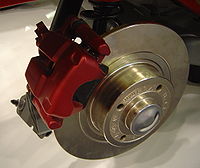
Photo from wikipedia
This study reports the influence of CVD-graphene on the tribological performance of gray cast iron (GCI) from the internal combustion engine (ICE) cylinder liners by performing a ball-on-disk friction tests.… Click to show full abstract
This study reports the influence of CVD-graphene on the tribological performance of gray cast iron (GCI) from the internal combustion engine (ICE) cylinder liners by performing a ball-on-disk friction tests. The graphene-coated specimen exhibited a significant reduction (∼53%) of friction as compared to that of the uncoated specimen, whereas wear resistance increased by 2- and 5-fold regarding the wear of specimen and ball, respectively. Extremely low shear strength and highly lubricating nature of graphene contribute to the formation of a lubricative film between the sliding surfaces and decreases the interaction between surfaces in the dry environment. Under the applied load, a uniform film of iron oxides such as Fe2O3, Fe3O4, and FeOOH is found to be formed between the surfaces. It is proposed that the graphene encapsulation with the metal debris and oxides formed between the specimens increases the lubricity and decreases the shear force. The transformation of graphene/graphite into nanocrystalline graphites across the contact interfaces following the amorphization trajectory further increases the lubricity of the film that ultimately reduces friction and wear of the material.
Journal Title: ACS applied materials & interfaces
Year Published: 2017
Link to full text (if available)
Share on Social Media: Sign Up to like & get
recommendations!